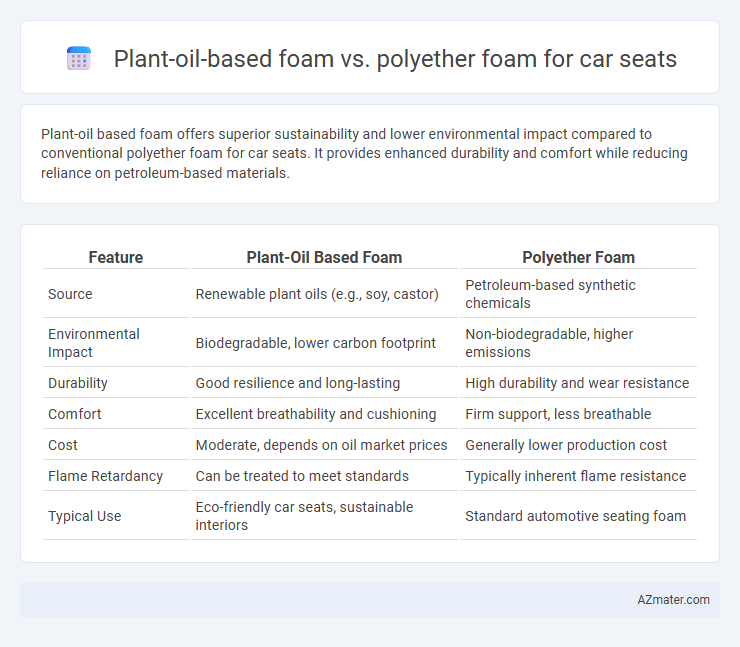Plant-oil based foam offers superior sustainability and lower environmental impact compared to conventional polyether foam for car seats. It provides enhanced durability and comfort while reducing reliance on petroleum-based materials.
Table of Comparison
| Feature | Plant-Oil Based Foam | Polyether Foam |
|---|---|---|
| Source | Renewable plant oils (e.g., soy, castor) | Petroleum-based synthetic chemicals |
| Environmental Impact | Biodegradable, lower carbon footprint | Non-biodegradable, higher emissions |
| Durability | Good resilience and long-lasting | High durability and wear resistance |
| Comfort | Excellent breathability and cushioning | Firm support, less breathable |
| Cost | Moderate, depends on oil market prices | Generally lower production cost |
| Flame Retardancy | Can be treated to meet standards | Typically inherent flame resistance |
| Typical Use | Eco-friendly car seats, sustainable interiors | Standard automotive seating foam |
Introduction to Car Seat Foams
Car seat foams play a crucial role in comfort, durability, and environmental impact, with plant-oil based foam emerging as a sustainable alternative to traditional polyether foam. Plant-oil based foams utilize renewable materials such as soy or castor oil, reducing reliance on petroleum and lowering carbon footprint while maintaining comparable cushioning and resilience. Polyether foam, widely used for its excellent elasticity and resistance to deformation, offers reliable performance but raises concerns regarding fossil fuel dependency and environmental sustainability.
What is Plant-Oil Based Foam?
Plant-oil based foam is a sustainable alternative to traditional polyether foam, manufactured by incorporating renewable plant oils such as soy, castor, or palm oil into the polyurethane foam matrix. This eco-friendly material offers enhanced biodegradability and reduced reliance on petroleum-derived chemicals, aligning with automotive industry efforts toward environmental responsibility. Its application in car seats delivers comparable comfort and durability while contributing to lower carbon footprints and improved material lifecycle sustainability.
What is Polyether Foam?
Polyether foam is a type of polyurethane foam commonly used in car seats due to its resilience, flexibility, and resistance to moisture and chemicals. It provides excellent cushioning comfort and durability, maintaining shape under prolonged use and exposure to varying temperatures. Compared to plant-oil based foam, polyether foam offers superior structural integrity but is less environmentally sustainable as it is derived from petrochemical resources.
Environmental Impact Comparison
Plant-oil based foam for car seats significantly reduces carbon footprint by utilizing renewable resources and enhancing biodegradability compared to conventional polyether foam derived from petroleum. It lowers greenhouse gas emissions during production and end-of-life disposal, contributing to reduced environmental pollution. Polyether foam, while durable and cost-effective, relies heavily on non-renewable fossil fuels and generates persistent waste, making plant-oil based alternatives a greener choice for sustainable automotive seating.
Comfort and Ergonomics
Plant-oil based foam car seats provide enhanced breathability and adaptive cushioning, improving overall comfort by conforming to body contours and reducing pressure points. Polyether foam, while durable and cost-effective, tends to offer firmer support with less responsiveness, potentially compromising long-term ergonomic benefits. The natural elasticity of plant-oil based foam supports spinal alignment better, promoting healthier posture during extended drives.
Durability and Lifespan
Plant-oil based foam used in car seats offers enhanced durability due to its resilient cellular structure and natural resistance to compression, resulting in a longer lifespan compared to traditional polyether foam. Polyether foam typically exhibits faster degradation under continuous stress and exposure to heat and moisture, reducing its cushioning performance over time. As automotive manufacturers prioritize sustainable materials, plant-oil based foams demonstrate improved wear resistance and retain shape integrity significantly longer, making them a durable alternative for long-lasting car seat comfort.
Manufacturing Process Differences
Plant-oil based foam for car seats is produced using renewable bio-based polyols derived from natural oils such as soybean or castor, reducing reliance on petrochemicals and lowering carbon emissions during manufacturing. In contrast, polyether foam relies on synthetic polyols generated from petroleum-based feedstocks, involving energy-intensive chemical processes and higher environmental impact. The plant-oil foam production integrates sustainable sourcing and can be processed using standard polyurethane foaming techniques with minor adjustments for bio-polyol reactivity, whereas polyether foam manufacturing follows established industrial protocols with consistent chemical profiles.
Cost Analysis: Plant-Oil vs Polyether Foam
Plant-oil based foam for car seats typically presents higher initial material costs compared to conventional polyether foam due to renewable raw material extraction and processing complexities. Polyether foam maintains lower production expenses, benefiting from established supply chains and economy of scale in automotive applications. Over time, plant-oil foam may reduce total cost through enhanced durability and environmental incentives, potentially offsetting upfront investments in sustainable vehicle manufacturing.
Safety Standards and Regulations
Plant-oil based foam for car seats meets key safety standards such as FMVSS 302 for flammability, providing comparable fire resistance to traditional polyether foam while offering enhanced environmental sustainability through renewable materials. Polyether foam, widely used in automotive seating, has established compliance with stringent automotive safety regulations, including occupant protection and durability criteria defined by automotive industry standards like ISO 9001 and SAE J1647. The switch to plant-oil based foam supports regulatory trends favoring reduced volatile organic compounds (VOCs) and lower toxic emissions, aligning with evolving EPA and EU automotive indoor air quality requirements.
Future Trends in Automotive Seat Materials
Plant-oil based foam offers a sustainable alternative to traditional polyether foam in automotive seats, leveraging renewable resources to reduce environmental impact. Advances in bio-based polyurethane formulations enhance durability and comfort while meeting stringent automotive safety standards. Future trends indicate increased adoption of eco-friendly foams driven by regulatory pressures and consumer demand for greener mobility solutions.

Infographic: Plant-oil based foam vs Polyether foam for Car seat
 azmater.com
azmater.com